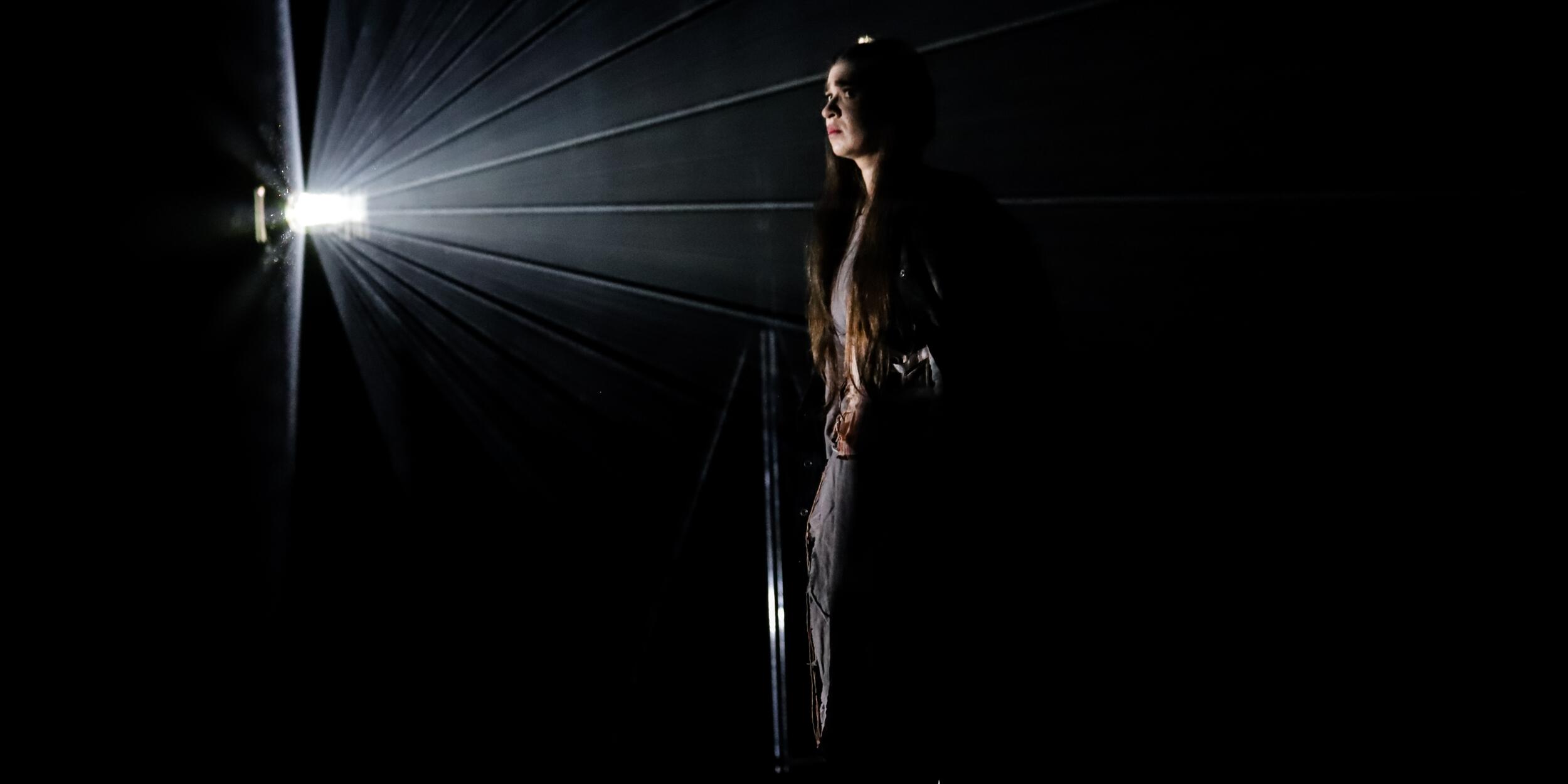When eras collide

Armela Madreiter, graduate of the Mozarteum University and dramaturge for the current music theatre production by Florentine Klepper and Kai Röhrig's opera class, Medusa / Giuditta, talks about fruitful collaboration, exciting female characters and crossing boundaries.
You studied applied theatre here at the university and currently live and work as a playwright and dramaturge in Vienna. How did your collaboration with Florentine Klepper on the production Medusa / Giuditta come about?
A few years ago, I provided dramaturgical support for a project that was being carried out in collaboration with the Thomas Bernhard Institute. I really enjoyed it, and it was no disadvantage that I don't come from an ‘opera dramaturgy’ background, but rather focus on writing and spoken theatre. Kai Röhrig and Florentine Klepper approached me with this project last year, and I didn't hesitate for long. Through my master's degree in Applied Theatre, I am used to working across boundaries and disciplines and finding connections, and I think it's great that this is also happening in this project.
With Yann Robin's Medusa and Alessandro Scarlatti's Giuditta, you are bringing two works from two completely different eras together on stage. How do you manage to create connections between the works, both musically and scenically, and combine them into a ‘musical theatre evening’?
There are various connecting threads. Some are quite obvious, while others may only reveal themselves upon closer inspection. The Baroque painter Caravaggio, who even appears as a character in our production, is certainly the one who brings everything together, as he painted both Giuditta and Medusa. We also talked a lot about the motif of the head and decapitation – this is also repeated in both works. Medusa is decapitated, Judith is decapitated. Similarly, both women are extremely powerful in their own way and at the same time serve as a projection surface for themes such as violence, power, fear, emancipation and sexuality.
What particular dramaturgical challenges, but also opportunities, do you see in this production? To what extent does the process-oriented working method, due to Yann Robin's composition being completed only gradually, influence your way of working?
It is always a challenge to combine two works, especially when they come from completely different eras. But this also creates a great deal of scope, a space for association between the works that has never existed before. I think that the ‘clash’ between the two musical works also tells us something about continuity. It is also about different dimensions of imagery in different eras. I believe that every exciting and curious artistic work must be a process. During rehearsals, the students are constantly searching and discovering on all possible levels. Of course, it is a challenge not to know exactly where the journey will take you at the beginning. But that is precisely what makes such a production so exciting and enjoyable.
A practical question: how do you ensure the flow of information between the director Florentine Klepper, Conny Zenk as the spatial, video and lighting artist, and you as the dramaturge, so as not to lose sight of the ‘big picture’?
Florentine is the one who pulls all the strings. Some things are discussed in one-on-one conversations, or we send each other long voice messages with our thoughts. But we also regularly got together for rehearsals, i.e. Conny Zenk, Lena Matterne (costume designer, note) and myself, and then discussed everything in detail afterwards. Each person brings their own perspective, depending on their expertise, which I have always found very productive and exciting. Sometimes ideas and solutions only emerge during joint discussions. In the final rehearsals, you have to pay close attention and sort everything out again. But that worked out great with this team!
What is your personal approach to contemporary music, especially contemporary music theatre?
I come from spoken theatre, also work a lot as an author and am a career changer in this field. But somehow, through dramaturgy at the Salzburg Festival, I kept coming across contemporary music theatre – so it seems to want something from me. In contemporary music theatre in particular, I appreciate the courage to cross boundaries: between music, language, movement and image, something radically new often emerges that amazes me, as in the case of Medusa by Yann Robin. Interesting texts are also important! We were lucky that Elisabeth Gutjahr agreed to do it and that we also had an excellent translator at our disposal in Fausto Tuscano.
How would you describe the two central female characters, Medusa and Giuditta?
Both are very ambivalent characters who do not quite fit into the classic image of femininity. Giuditta makes active decisions and takes action – religiously legitimised, strategically astute. Medusa becomes a symbol of a suppressed but not silenced force. The evening thus brings together two contrasting but related female characters: both represent borderline experiences, moments of decision, the interplay of gaze, beauty and violence. And both reflect – each in her own way – the tension between femininity, power and threat.
Dates
-
13.6.202507:00 pmMax Schlereth SaalMedusa / GiudittaZwei Frauen, zwei Legenden: Das Oratorium „Giuditta“ von Alessandro Scarlatti (Libretto: Antonio Ottoboni) wird mit der Uraufführung der Kammeroper „Medusa“ (Libretto: Elisabeth Gutjahr, Musik: Yann Robin) verwoben.Opera· Tickets (Opens in new tab)
-
14.6.202504:00 pmMax Schlereth SaalMedusa / GiudittaZwei Frauen, zwei Legenden: Das Oratorium „Giuditta“ von Alessandro Scarlatti (Libretto: Antonio Ottoboni) wird mit der Uraufführung der Kammeroper „Medusa“ (Libretto: Elisabeth Gutjahr, Musik: Yann Robin) verwoben.Opera· Tickets (Opens in new tab)
-
16.6.202507:00 pmMax Schlereth SaalMedusa / GiudittaZwei Frauen, zwei Legenden: Das Oratorium „Giuditta“ von Alessandro Scarlatti (Libretto: Antonio Ottoboni) wird mit der Uraufführung der Kammeroper „Medusa“ (Libretto: Elisabeth Gutjahr, Musik: Yann Robin) verwoben.Opera· Tickets (Opens in new tab)
-
17.6.202507:00 pmMax Schlereth SaalMedusa / GiudittaZwei Frauen, zwei Legenden: Das Oratorium „Giuditta“ von Alessandro Scarlatti (Libretto: Antonio Ottoboni) wird mit der Uraufführung der Kammeroper „Medusa“ (Libretto: Elisabeth Gutjahr, Musik: Yann Robin) verwoben.Opera· Tickets (Opens in new tab)